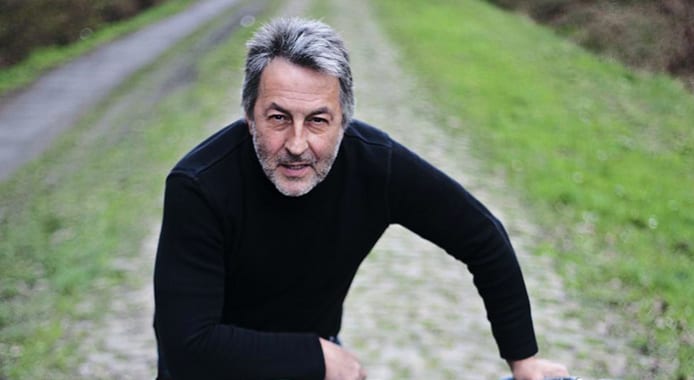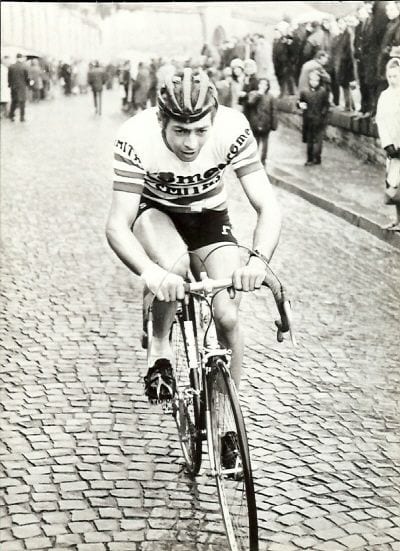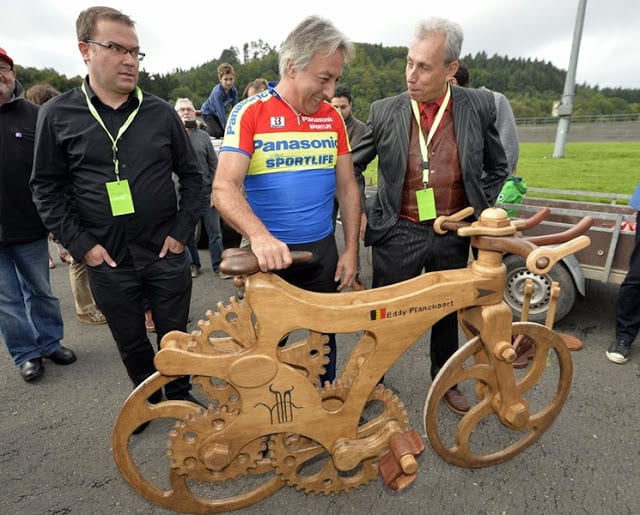Wildman in the Woods
Chris Sidwells Interest England 14 July 2020
Eddy Planckaert was and always will be unconventional. In 2006 the Belgian classics star was living in a log cabin deep in the Ardennes forest with no mains water or electricity.
Eddy Planckaert lives in a tepee in the woods. That was the rumour I heard in 2006. Planckaert was as tough as any competitor when he raced, but his soul and spirit were different. Living with Native Americans, experimenting with transcendental meditation and out of body experiences were two of many things he wanted to try. Living in the woods, in a tepee; yeah, that sounded about right.
I tracked him down through a mutual friend, Albert Beurick, a name familiar to the many Brits who raced in Belgium in the 1960s and beyond. Planckaert was living deep in the Ardennes forest, and he had a tepee. “It’s just for the summer though,” he told me after Albert and I navigated the steep stony track to where he lived with his big boisterous family in a basic log cabin.
It was the only place they could afford, although throughout our interview Planckaert stressed that he was enjoying the experience. Fact is he’d lost most of the money he’d ever made winning the Tour de France green jersey, Paris-Roubaix, Tour of Flanders and many other races. Why he retreated there is part of a long story, which he told me over the next couple of hours.
Youngest brother
Eddy Planckaert is the youngest of three brothers, sons of a Flemish farmer. All were pro bike racers, and all were successful. The eldest, Willy blazed the family trail into professional cycling after scoring a Belgian record number of win in one season with the amateurs. He continued winning with the pros, taking the green jersey in the 1966 Tour de France, and he raced until he was well into his forties.
Walter was next; a fierce looking granite slab of a bike racer, with a gentle heart. He won the Tour of Flanders in 1976, and went on to be a successful and respected sports director. Then there was Eddy, “From the day I first opened my eyes all I saw was bikes,” he told me. He was the best of the Planckaerts, with the best results. Willy’s son Jo, and Eddy’s son Francesco were both pro racers, but both were less successful than their dads.
However, even though he was surrounded by bikes Eddy’s memory that all others lead from was the death of his father. “It was the start of my life. I remember everything after that, but little before it,” he said, recalling the mental picture of his father lying injured at the scene of a car crash. Only minutes before the family had been celebrating, the accident happened while travelling home from watching Willy Planckaert win another race. It was a shattering experience.
His father hung on, hospitalised for a year. A photograph in Eddy’s autobiography De Helse Tocht (The Hell Tour) shows him standing uncomprehending, knee-high to the rest of his family. They are looking down at the broken, bed-ridden man, but Eddy is looking at the camera, his expression asking why. He’s been asking why ever since.
Questions
“It was a terrible thing to see your father hurt like that. It opened my eyes and made me wonder about the fairness of things, about whether there’s a God for example. If there is, with all the pain in the world, we will fight the day I see him, I promise that,” he said.
After their father died Willy took over as head of the family and Eddy got even closer to his mother: “A truly beautiful woman who was left at 45 years old with no man, no money, but she never let us go without.”
Another person the teenage Planckaert bonded with was a rival, not a Belgian but a young man of his own age who travelled from the other side of the world to race in Europe. “I won everything as an amateur, it was easy,” Planckaert said. “I would hit the front and the opposition disappeared. Then one day I attacked as normal, moved over to see what damage I’d done behind me, and this kid I’d never seen before flew past growling at me; it was Allan Peiper.
“I thought; what’s this? I’d never seen aggression like it. After that day we attacked together in every race. I still won because I was a better sprinter, but one day I said to Allan; you must win a race, I will give you the next victory. And he said; “No you won’t. If I win, I win – I beat you. But don’t give me anything.” I’d never known anyone like him, so prickly, so good and so honest.
“We grew very close. One day I went to the place where Allan was staying in Ghent and it was terrible, the worst house I’ve ever been in. I couldn’t have lived there, so I asked my mum if Allan could stay with us. Of course she said yes, and he moved in with me, sharing my room. We became closer than brothers. We believe the same way. Allan can be anywhere in the world, but I feel him here next to me still.”
Stand-out win
Eddy quickly found his feet as a pro. He was fast and strong, ideally suited to the classics, and given his Flemish roots you might be surprised which of all his victories stands out the most? “Every victory is beautiful,” he told me. “Paris-Roubaix is an obvious choice, but I’m proudest of my green jersey in the Tour de France. That was emotional for two reasons.
“First, my brother won the green jersey, I can remember him wearing it. That already made it special, but what is even more incredible is the feeling you get from standing on the Champs-Elysées wearing one of the jerseys from the greatest race in the world. There you are, only a little bike racer and the whole of Paris is stopped just for you. You feel like you own the Champs-Elysées that day. It’s incredible.”
Are there any races he feels he could have won but didn’t? “Yes, Milan-San Remo. That is a race with my abilities I should have won. If I hadn’t been forced to stop after 1990 because of my injured back, I surely would have won it.”
Looking back, which team he rode for did he like the best? “For organisation and giving you every opportunity to win it was Panasonic,” is Planckaert’s predictable answer, but he has too much soul to leave it there.
“The best feeling I ever had in a team was with ADR. The spirit in that team was incredible. The manager, José de Cauwer created a team that was like a family. We felt like a family. And our results were amazing. I won the Tour of Flanders, Dirk Demol won Paris-Roubaix, and then there was Greg LeMond.”
Indeed there was. In 1989 the ADR team, a collection of Flemish riders brought together by the promise of big money, a promise not delivered to most in the team, gave Greg LeMond a lifeline when he was struggling to get fit after recovering from near fatal gunshot wounds. No other team was there for him, and LeMond repaid ADR them with victory in the Tour de France and the World Championships, which was huge. LeMond also made a huge impression on Planckaert.
“He was so strong; amazing because he was so fragile. I remember in the 1989 Tour, in the team time trial, Greg was going so hard I couldn’t take my turn. I was one of the best in the team time trial with Panasonic, which was the best-ever in team time trials in my opinion. I could always take my turn with Panasonic, but this time I had to let Greg ride for two kilometres before I could go through,” Planckaert said.
Physical strength was something the Planckaert family held in high esteem. Everything the brothers did, everything they ate was to build strength for their cycling careers, but physical strength is less use once that life is over. In a bike race you can use your strength to batter the opposition. Planckaert found outside cycling can be a lot more complicated, and much harsher.
Unconventional
He always had a reputation for being unconventional, which in the conservative world of cycling is not difficult, although even the most free-thinking would acknowledge that some of Eddy Planckaert thoughts and hopes were pretty put there. But studying the ways of Native Americans and Eastern mystics, as well as practising yoga in the hope of an out of body experience helped him cope with what had happened in the years immediately following his racing career.
When I visited Planckaert in 2006, despite all the races he won and the money he earned doing it, all the training and all his strength, he was flat broke, and the experience nearly killed him.
“I thought about suicide, I even planned the way I would do it,” Planckaert told me. “I was going to take a chain and padlock myself to a pier in the sea when the tide was out. Then I would throw away the key and wait for the water to return.
“I could have done it too, for myself. You are a prisoner in this world and I think that death is a release, but I have a family and I could not leave them. That would be the moment though, wouldn’t it? Not when you lock the padlock, but when you throw away the key, then you will know something, eh?”
Thinking about and planning to take his own is a terrible thing to go through, but Planckaert resolved what was bad in his life by focussing in what was good. By the time he started again in his humble hunter’s lodge he was happy, truly happy, living with his extraordinary family with nature all around them. There was no running water and no electricity, but it didn’t seem to matter and he was able to speak freely and without bitterness about what had happened to him.
“After I stopped racing what I wanted to do was go into the mountains and concentrate on my meditation. I wanted peace, but what I wanted was a lot to ask of my wife, so I bought a farm to be close to nature. But you must have a steel heart to be a good farmer, and it wasn’t much of a challenge.”
That last statement might seem a bit strange, until you know that Planckaert did not want to stop racing; his back stopped him racing. He tried to come back, but couldn’t. At the time he was running his farm he told journalists that he missed the struggle of bike racing. Then he announced that he had bought a saw-mill in Lithuania. Now he had his struggle.
Even the most experienced, hard-bitten businessmen were wary then of doing business behind the old Iron Curtain. A romantic like Planckaert was certain to have problems, but even he couldn’t have guessed their extent.
“Working against the old Soviet apathy meant it was a constant fight to motivate the people in my factory. But I loved the place, I improved it, I spent thousands on buildings and machinery. We also bought a small log cabin in the woods. It was so quiet, only the forests and nature; deer, elk and wolves to keep you company. For a while I had everything; my struggle and my peace,” he said.
But without him knowing, things were going wrong. “I found two people I trusted. Things seemed to go well at first, but behind my back they were cutting me out in a very professional way. In the end I had responsibility all the factory’s debts, but I could not touch its profits. They stole it from me.
“I could have fought them, but there are two laws in Lithuania: the one you find in the courts, and the other is gun law. I was threatened, and I was scared for my life and the lives of my family. I had to come home to Belgium, and without income I could not pay my debts, so I had to go bankrupt. And that’s where I am now.”
Planckaert wasn’t bitter, just very matter-of-fact about it all, accepting even. Didn’t it make him angry being robbed like that? “It did, but now I have discovered happiness, I have discovered I don’t need money. I had money, and losing it made me sad. But now I am happy about it, and I see how pointless money is.
“People run around for money and power, do terrible things to each other. Money brings out the beast in all of us. Money made the white man rob the Native Americans, money makes babies starve because of a cent on a barrel of oil. Money turns us into beasts. I have no money and I am happier now than ever I was. Everything I have now is real.”
Postscript:
Not long after I did this interview a TV producer visited Eddy and his family at their cabin in the woods, and from that visit a series was born. It was called De Planckaerts, and it was about Eddy having various adventures set against him and his family living their lives. It became very popular in Belgium, making personalities out of the lot of them. It also earned them a bit of dosh in the process, so today they are okay. But with or without money you can bank on Eddy Planckaert always being happy.
About the Author, Chris Sidwells
Chris Sidwells is a freelance writer, story teller and editor with 16 years experience. He has provided content and/or photographs for a multitude of features in magazines and websites including Cycling Weekly, Cycle Sport, Cycling Active, Cycling Fitness, Tour, Bicycling, GQ Magazine, Bicycle, The Roar, Men’s Fitness, Running Fitness, the Guardian, Independent, Daily Telegraph, Sunday Times and the BBC.
Chris has written 21 books on every aspect of cycling, three of them coffee-table books, supplying photographs as well as words for some of them. Most have run to multiple editions, some have been best-sellers in their genre and many have been translated and are sold throughout the world. He has also contributed to or edited ten other titles.
In November 2018 Chris launched his own independent publishing business called Cycling Legends. Cycling Legends has two major areas of expertise; the creation of standard and illustrated books, and the provision of print-ready designed content for other publishers, public bodies and for businesses to use online or on paper.
The Cycling Legends illustrated book series embodies the Cycling Legends publising mission; telling the full and little heard or untold stories through words and rare or previously unpublished pictures. Cycling Legends is a unique concept in British cycling media.
Chris joined Unfound Founder Jules on the ‘Something for the Turbo’ podcast in Episode 16 in June 2020.
-
Chris Sidwells.com
Visit site -
Cycling Legends
Visit site




